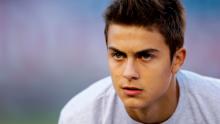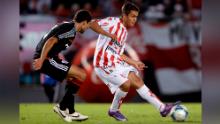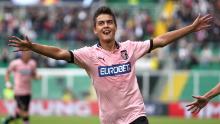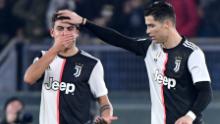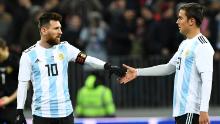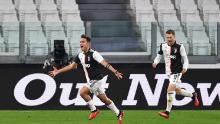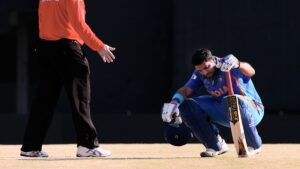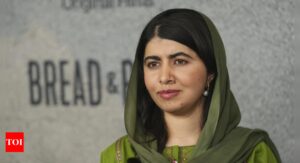Paulo Dybala exclusive: The boy from the town “where dreams seem unreachable” who became a global superstar

Few countries in the world have a passion for football quite like Argentina — Dybala jokes that “when you are born, first they give you a ball, and then a dummy” — and like almost every other child in the country, he dreamed of becoming a footballer.
After Adolfo, it was Instituto that first noticed Dybala’s prodigious talent and offered the lithe teenager a place in the club’s youth system.
Cordoba in itself can often seem a world away from Laguna Larga, so for Dybala to have made it to Juventus and the Argentine national team — and played alongside Cristiano Ronaldo and Lionel Messi, the two greatest players of his generation — is, in his words, “unthinkable.”
“The truth is, I never imagined I’d reach such heights,” Dybala tells CNN in an exclusive interview ahead of Serie A’s restart on June 20, with Juventus’ first game away at Bologna on June 22.
“I always wanted to be a football player, I always loved this sport a lot and the truth is — and I’m sincere — I never thought that I would get here, to a club as important as Juventus, to play for the national team of my country, to play with the best players in the history of football.
“I really enjoy what I’m experiencing every day, because it’s something that is unthinkable for a person who comes from such a small town, where we are six thousand inhabitants, where dreams often seem unreachable.
“Today I am fulfilling almost all of them and surely with time goals are going to continue to arise, dreams, that I hope I can continue to fulfill, but I try to enjoy it as much as for my father as for me, as for all my family too.”
Adolfo was as much a friend to Dybala as he was a father.
In 2008, when Dybala was just 14 years old, the whole family had to try and come to terms with Adolfo’s sudden death following a short battle with cancer. Unsurprisingly, the loss of his confidant and biggest supporter affected Dybala’s development as both a player and a person.
While his own mental fortitude eventually allowed him to flourish, Dybala credits the support of his close-knit family for getting him through one of the toughest periods of his life.
“I can’t say what would have happened if he was still here,” he says. “Maybe all this would have still happened, maybe not, maybe I would have lived it differently. One never knows why [these things happen], but these are moments in life in which one grows or not — or many times suffers.
“In my life, luckily, I was able to move forward — although it was not easy to continue fighting for what I liked [football] — more than anything to continue doing what made me happy, which is playing football, which is being with a ball, to share time with teammates, friends. That’s what football gives me.
“It was a blow, a hard blow for the family, but from then on we started making decisions. I had to start maturing in a certain way a little faster because of the situation I was living and obviously I would have liked to share everything I’ve lived, everything I have learned and the places I have been, people that I have met with my father.
“But I know somehow he’s always with me always. I always feel that when I play, when I am on a pitch, he is close to me and that is what makes me enjoy this beautiful sport even more.”
‘La Joya’
Though Dybala still keenly felt his father’s absence, he would quickly establish himself as the most promising youngster in Instituto’s academy.
At the age of just 17, he made his professional debut for the club in Argentina’s unforgiving second division. Such was his immediate impact, an Argentine journalist labeled him ‘La Joya’ — The Jewel — a nickname that still remains.
In only his second match, he broke the 41-year-old record of legendary Argentina striker and World Cup winner Mario Kempes to become Instituto’s youngest ever goalscorer.
After just one season, he made the leap to Europe with Italian club Palermo in a deal reportedly worth $14 million. Three successful seasons in Sicily followed — the third of which was truly his breakout in Europe — and convinced Juventus to part with upwards of $40 million for Dybala’s signature.
The last two years have seen the 26-year-old develop from a promising youngster into one of Europe’s most exciting talents, with Manchester United and Paris Saint-Germain both trying to lure him away from Turin last summer.
His recent ascent should perhaps come as no surprise; Dybala, after all, is one of very few players to have had the joy of playing alongside both Ronaldo and Messi.
Dybala says he has a learned a lot from Ronaldo since the Portuguese star moved to Juventus in 2018, noticing in particular an improvement in his mentality.
“The truth is that you learn a lot because he is a player, in this case, who is a winner and that makes you a winner,” Dybala says. “He is a very professional player, needless to say. Everyone knows that already.
“How he has managed to make his career, how he has managed to win his trophies, his accolades, everything he has earned through sacrifice, training. So one always feels admiration and tries to learn from the things he has.
“I always say that each player has better things than others, so one always tries to pinch off the best that each one has, to learn and grow and from Cristiano there is a lot to learn.”
Since making his Argentina debut in 2015 — widely thought to be a somewhat belated call-up — Dybala has shared the international stage with compatriot Lionel Messi.
Dybala is arguably better placed than anyone to answer the eternal debate: Messi or Juventus teammate Ronaldo?
When asked, Dybala smiles and answers diplomatically.
“I see a big difference, but I try not to compare them,” Dybala says. “I think I rather try to enjoy them and I just learn from both of them. They are incredible players, the best in history, that everyone will remember forever and I have the opportunity to speak with both of them, to learn from the two, to share pitch with the two.
“Leo is also an incredible player who plays in such a natural way that many times people think that what he’s doing is easy and the truth is that it’s impossible how he moves, how jumps past players, how he dribbles past players so easily, the truth is that is incredible.
“Over time, he has been perfecting that way of playing, of working. He is a very professional player, too, which often does not get talked about it, but in training sessions he is amazing. The truth is, well, working with these two monsters is very nice.”
Overcoming coronavirus
Back in March, when the coronavirus pandemic first began to take an unrelenting grip on Italy and Europe, Dybala was one of the first high-profile sportsmen to test positive for Covid-19.
It was at home one evening when he first noticed something was wrong. Something as simple as climbing the stairs would leave him trembling and short of breath.
Two Juventus teammates, Daniele Rugani and Blaise Matuidi, had already tested positive and Dybala soon had it confirmed that he was the third.
“Luckily I never had very strong symptoms that worried me, so I didn’t get scared,” Dybala says. “But I always took precautions and I always tried to speak with the doctors to remain calm.
“At first the symptoms were calmer but I noticed certain problems, some difficulty in my breathing at the time of training. The symptoms, in general, I felt at night when I was going to sleep or when I was lying down.
“I always tried to remain calm, to give my family tranquility as well because I didn’t want to worry them, since they were far away.”
For almost two months, his fight with the virus was played out in the media amid reports he had tested positive four times, leading many people to assume that he had become reinfected.
Dybala says it was difficult reading certain inaccurate stories on his health, in particular when they would cause his family to frantically phone him from Argentina.
His girlfriend, Argentine actress and singer Oriana Sabatini, also contracted the coronavirus but Dybala says the couple stayed calm, more for their families’ sake than their own.
“I just had to try to reassure my family, since they were already far away,” he says. “So both me and my girlfriend tried not to worry. We also saw and read things from many people who were worse than us.
“So being quarantined with the coronavirus and being able to stay calm in our home, we always tried to take it very cautiously, very calmly. If we decided to send a message, we did it in a positive way to not alarm people.
“The doctors explained to me that in a minority of cases, the time in which the coronavirus stays in the body is a little longer, depending on the body’s defenses in each person, or how fast one can create the antibodies so that the virus goes away.
“Mine took a little longer. Fortunately, my girlfriend’s left earlier, so she had fewer tests than me. That’s where many times people get confused when they think you can catch it again. What is true is that I never got reinfected, it never left. I always had it.”
Piedmont, the area of Italy where Juventus is based, was one of the regions hardest hit by the pandemic. The club set up the ‘Distant but united’ campaign to help raise funds for the purchase of medical equipment and support local healthcare facilities and medical staff.
The first-team squad and coach Maurizio Sarri also agreed to give up four months’ wages to help the club manage the economic impact of the coronavirus pandemic, saving the club more than $100 million.
Dybala says the players didn’t hesitate when they were asked to take a pay cut. Their only concern was ensuring all of the club’s employees continued to receive their salaries throughout the crisis.
Football’s return
Juventus’ Coppa Italia semifinal against AC Milan on Friday was the first time elite football had been played in the country since authorities postponed the season back in March.
While there has been some talk about letting fans back into stadiums, for now all matches will continue to be played behind closed doors. Wednesday’s final, which Juventus lost to Napoli on penalties, saw banners in each of the clubs’ colors draped over the seats at Rome’s Stadio Olimpico.
It’s been called the “new normal” by many, but Dybala says it’s something he could never get used to. He finds the completely empty stands particularly hard to accept when, in his eyes, much of Italian society has returned to normal.
“It’s weird finding yourself playing a game without fans,” Dybala says. “But it’s also weird that when I go down the street I see bars or restaurants full of people, with people outside, without [distancing] measures — then it seems strange to me that certain things are enabled and other not.
“Because what is the difference between a disco full of people, to a stadium takes its [distancing] measures so that a certain number of people can go? I know that it’s difficult for that to happen, but for many things sometimes people just have to make the decision.
“I spend every day in the city center, going to train or going to certain places, and the truth is that I see many people like that, to some extent they have already forgotten about the coronavirus and it’s as though nothing has happened anymore.
“I think that many rules are being violated and the truth is that in football, without people it is sad. Without the public, without our fans, playing football is boring, because I think they are part of the atmosphere of this, which is the most important thing in football.”
Dybala hopes that by the time the Champions League returns — confirmed by UEFA to be in August — restrictions on fans will have been eased slightly. After all, Juventus will need all the help it can get to overturn the 1-0 first-leg defeat to Lyon.
However, the club’s focus is now on securing a ninth consecutive top-flight title. After months of health problems, Dybala is finally fighting fit and ready to lead Juventus through the remaining 12 league matches — thanks in part to his new “training partner,” puppy Kaia.
Dybala and Sabatini adopted the Shiba Inu at the start of lockdown but after only four days she, too, developed health problems.
“One day she was bitten by a bug in our garden and we had to take her to the vet,” Dybala recalls. “For a day she scared us a little because she wasn’t very well, she was vomiting.
“Luckily she’s fine now and getting huge. She’s very big and we’re happy to now see her growing,” he adds with a proud smile, as though talking about a child.
Dybala knows the size of the task that lies ahead; second placed Lazio was the most in-form team in Europe before the coronavirus brought Serie A to a halt and in Ciro Immobile boasts one of this season’s most prolific strikers.
For now, though, he’s just enjoying being able to play football again.
“It was something I really missed,” he says. “I have never been so long away from my colleagues, my work, the people around us. There are many people with us that often are not seen, that are not in front of the cameras, like doctors, physiotherapists, part of the technical staff, press people, kitmen, analysts.
“I forget the amount of people that we have with us and you miss sharing all those things day by day. Obviously now we’re enjoying it again, trying to get everything we were doing back into rhythm.
“We want to continue winning trophies. We want to stay on top of Italian football. It won’t be easy, but hey, we will give it our best shot.”

